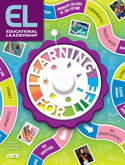Research Alert
What Signals College and Career Readiness?
A recent report from the American Institutes for Research describes college and career readiness indicators that the 50 U.S. states and the District of Columbia currently track and report publicly in four areas:
- Academic content. All states and the District of Columbia report student performance in English language arts and mathematics, 49 states report student performance in science, and 21 states report performance in social science.
- Career and technical education. Even though federal law requires states to collect and report data on students who participate in career and technical education (CTE), only 24 states currently report student enrollment in CTE courses.
- Lifelong learning skills. Although aptitudes like social and emotional skills, higher-order thinking abilities, and financial literacy are essential to college and career success, the closest states come to assessing these areas are "imperfect and incomplete proxy measures," such as attendance, truancy, dropouts, and discipline. The report cites a few exceptions. For example, Hawaii records student voter registration, and Oklahoma and Alaska detail the average number of student volunteer hours by school.
- Postsecondary outcomes. Only 36 states provide any information about what their K–12 students do after graduation. Some of the most common measures are postsecondary enrollment (35 states); college remedial course enrollment (21 states); and first-year college grade point average (10 states).
How Are States Reporting on College and Career Readiness? by the College and Career Readiness and Success Center at the American Institutes for Research is available at www.ccrscenter.org/sites/default/files/AskCCRS_Metrics.pdf.
Screen Grabs
Beyond a Single Calling
"What do you want to be when you grow up?" It seems like an innocuous question to ask young children to get them thinking about their future. But what does this question mean to students with a large number of interests? In her TEDxBend Talk, career coach Emilie Wapnick describes how the idea of pursuing a single calling made her anxious as she grew up. She shares stories of people she dubs multipotentialites—those who have used their wide mix of skills and experiences to build successful, sometimes unconventional careers. Instead of encouraging students to choose a single path, she suggests that society make room for people who move from path to path, as well as those who prefer to specialize.
Relevant Reads
In Defense of a Liberal Education by Fareed Zakaria (W.W. Norton, 2015)
"In an age defined by technology and globalization, everyone is talking about skills-based learning. Politicians, business people, and even many educators see it as the only way for the nation to stay competitive. … An open-ended exploration of knowledge is seen as a road to nowhere."
So writes journalist Fareed Zakaria in this book's opening. Zakaria offers a reasoned defense of a liberal arts university education, explaining why studying subjects like history, philosophy, or the arts—and learning through approaches typical of liberal arts—is still a practical idea for young people.
In addition to agreeing with the usual claim that a liberal arts education teaches one how to think, Zakaria asserts three more specific advantages: a liberal arts education teaches a person how to write, how to speak, and how to acquire knowledge. Citing writing-heavy practices for business leaders, Zakaria shows how "technology and liberal education go hand in hand in business today." Liberal arts or training in job skills is not an either-or choice.
The book's last chapter defends today's students, who some say are intellectually shallow or too concentrated on "getting ahead." Zakaria uses data to argue that youth leaving college today face a tougher world than Baby Boomers ever did, so practical-mindedness and intellectual exploration are probably in order.
Online Only
CTE On Demand
The National Association of State Directors of Career and Technical Education Consortium offers a range of free webinars about CTE. Past webinars (available on demand with full recordings and presentation PDFs) have covered globally minded CTE programming, employer engagement, and CTE as a STEM strategy. Other webinars have highlighted specific states that have revitalized work-based learning. A full listing of both upcoming and archived webinars is online.
NUMBERS OF NOTE
Ready for the World?
In an August 2015 survey, 917 parents of recent public high school graduates were asked about their children's preparation for college and career.
PREPARATION
Respondents who believe that high school prepared their children very or extremely well for college academics.
73% of Parents, 53% of Students
SATISFACTION
Respondents who are at least somewhat satisfied with the student's preparation for success after high school.
84% of Parents, 56% of Employers, 35% of College Instructors
EXPECTATIONS
6 in 10 recent high school graduates say they would have worked harder if they had understood the expectations of college and the work world.
<ATTRIB> Source: Achieve's Rising to the Challenge: Are Recent High School Graduates Prepared for College and Work? Retrieved from www.achieve.org/rising-challenge-survey-3-powerpoint </ATTRIB>
PageTurner
There is no shortage of brilliant people with brilliant ideas but rather a serious shortage of people who can verbally communicate those ideas. —Erik Palmer

